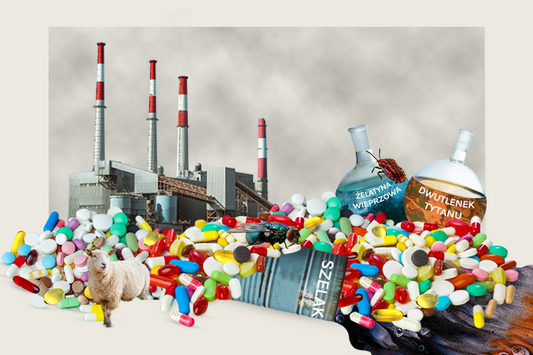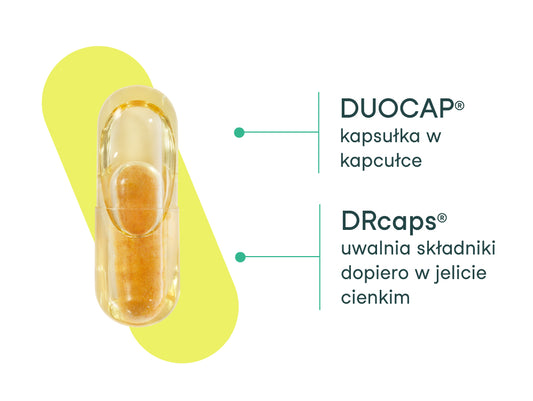
What will remain when dietary supplements - including "premium" ones - are stripped of their beautiful, non-ecological packaging and aggressive advertising?
The contents of beautiful non-ecological jars may surprise us quite a bit. Supplement manufacturers add ingredients without proven clinical effectiveness to their products, as well as substances that are not absorbed at all . Some people boast about large doses of vitamins and minerals , but is more always better? By swallowing the capsules, we get, among others, "for free": insect droppings (shellac) and carcinogenic dyes (E171) . We often know nothing about the conditions in which supplements are made and where their individual ingredients come from . Are we therefore sure that the supplement producers who serve us such products aim to take care of our health? To answer this question, let's discuss each of these points.
Chemistry in dietary supplements.
We have already become a habit of reading food labels, but when it comes to the composition of dietary supplements, we do it much less often. Maybe we think that there won't be a lot of "chemistry" in a small capsule or tablet? Nothing could be further from the truth. Dietary supplements contain many unnecessary additives :- magnesium stearate (also: magnesium salts of fatty acids),
- sodium carboxymethyl starch,
- xanthan gum,
- titanium dioxide,
- diphosphates,
- phosphates,
- guar gum,
- hardened oils - e.g. soybean, palm.
- shellac (resin obtained from insect excrements),
- pork gelatin (including animal skins and bones),
- aspartame,
- acesulfame K,
- sodium saccharin,
- glucose-fructose syrup,
- saccharose,
- sodium bicarbonate,
- calcium carbonate.
We could go on like this...

So what are these additives in dietary supplements for?
The ingredients listed above are used to extend the shelf life of supplements, improve their appearance or taste, and reduce production costs. They help you maximize your profits . But do you also benefit from it?
These "freebies" may not be digested by humans at all and/or may be harmful to us , especially if consumed in large quantities (e.g. if we use many products with these additives). They can:
- irritate the intestinal mucosa, cause intestinal cramps and diarrhea (e.g. magnesium stearate 1 , xanthan gum 2 ),
- cause inflammation in the body (e.g. hydrogenated soybean and palm oils3 ) ,
- cause allergies (e.g. magnesium stearate, guar gum, phosphates),
- cause premature aging (e.g. phosphates 4 ),
- disturb the functioning of the nervous system (e.g. dyes 5 ),
- cause flatulence and gases (e.g. guar gum 6 , phosphates 7 ),
- worsen kidney and heart diseases and cause edema (e.g. diphosphates 8 ).
Supplements for children (but not only) contain a lot of sugar or its synthetic and semi-synthetic substitutes : sorbitol (E420), mannitol (E421) and aspartame (E951) . Beautiful colors of vitamins in jellies or dragees, their smooth, shiny surface is achieved thanks to dyes and other additives that may have a negative impact on children's concentration and attention - e.g. yellow dyes E102, E104, E110 and red dyes E122, E124 and E129 9 .
Is all this legal?
We will tell you with an example. The carcinogenic dye E 171 (titanium dioxide) was approved for use until May 2021. Manufacturers added it to medicines, dietary supplements, toothpastes, candies, gum and mayonnaise to obtain a snow-white color. Although it is currently banned due to its carcinogenic effects, products placed on the market before the ban came into force are still present on store shelves.
Active ingredients of dietary supplements without proven clinical effectiveness.
Many active substances that generate huge profits for dietary supplement manufacturers today have not been proven to be effective in clinical trials. Example? L-carnitine, which is added to some dietary supplements for weight loss, because in theory it is a substance that contributes to the burning of fatty acids in cells and thus obtaining energy. In practice, numerous studies involving humans and animals have confirmed that L-carnitine does not help get rid of excess weight 10, 11, 12, 13 . Moreover, its supplementation may cause nausea and diarrhea 14 .

Forms of ingredients that we do not absorb.
The chemical form of active substances in the composition of supplements is a key issue. Take, for example, folic acid (which should be supplemented not only by women, and not only during pregnancy). “Traditional” folic acid must first be converted by the body into its active form in the liver. As many as 60%-70% of us may have a mutation of the MTHFR gene, as a result of which the activation process is blocked. 15 . Scientific research has proven that taking active folates is more effective, even for people without the mentioned mutation 16 . Despite this, you will still find "ordinary", cheap folic acid in most dietary supplements. You can read more about the difference between folic acid and active 5-MTHF folate here.
Ingredients in dietary supplements in too high doses.
Choosing dietary supplements that offer higher than optimal doses does not mean greater health benefits. In the long run, such supplementation may unnecessarily burden the body , or we may simply overdose on the active ingredients . Example? The very popular supplementation with a complex of B vitamins in excess can cause nausea, vomiting, allergic symptoms and even damage to the nerves and liver 17, 18 .
Remember that the best way to provide the body with the necessary nutrients is... food. Supplement only what you cannot supplement with a varied diet. The need to supplement one or another substance must be supported by medical knowledge and clinical research. You can read more about why diet is the basis of our health here .
Ingredients of unknown origin.
Very often, manufacturers do not provide information about where the individual ingredients of their multivitamin complexes come from. They provide only the minimum information required by law about the product - they do not provide the above-mentioned form of ingredients or the name of their supplier.
The quality of an active ingredient directly depends on how, where and by whom it was produced. Therefore, it is worth demanding transparency from producers regarding the supply chain . It is also worth choosing companies that use patented and carefully tested ingredients from the best suppliers with clinical research facilities.
Example? Active Quatrefolic folate from the Italian company Gnosis . At this point, it is the most bioavailable form of folic acid on the market, which the body can use immediately. Quatrefolic is an innovative and patented ingredient, and its safety has been confirmed in Europe (EFSA, European Commission Novel Food approval), USA (GRAS, FDA approval), Australia, South Korea and China 19 . Despite this, manufacturers still use ordinary folic acid of unknown origin in dietary supplements and multivitamin complexes. A large percentage of people are simply unable to absorb it due to genetics, as we mentioned above.

“Tests by independent laboratories” do not always guarantee the quality of a dietary supplement.
To be approved for marketing, each supplement must undergo several laboratory tests, including: for heavy metal content or microbiological purity testing. This is the basis, the minimum required by law. Messages stating that the preparation has been tested by independent laboratories may simply mean that it has passed the minimum mandatory tests allowing it to be placed on the market.
The law requires much more advanced quality and safety tests for medicines. Each batch of medicine is checked before it leaves the warehouse and is placed on the market and at the end of its expiry date. In both the first and second cases, the composition of the capsule or tablet should match the label. In the case of supplements, these tests are not obligatory, but manufacturers who ensure the highest quality of their products perform them.
Why is it so important?
We will tell you again with an example. In January 2021, GIS (Chief Sanitary Inspectorate) tested the Total Men dietary supplement 20 . The study showed that it contains sildenafil - a substance used to treat erectile dysfunction. But it wasn't on the ingredients list! Sildenafil can only be sold as a drug ingredient, including it in a dietary supplement is prohibited and dangerous! This ingredient has contraindications for use, so it could harm people who unknowingly took it as part of the Total Men supplement. If its composition had been tested before placing this product on the market, this situation could have been avoided.

In addition to research, the production conditions of supplements are also important.
Medicines, unlike dietary supplements, must be manufactured in places with GMP ( Good Manufacturing Practice ) certification, which guarantees the purity of the production process and the quality of the finished product . You can read more about GMP in a separate article . When choosing a dietary supplement, it is worth paying attention to the principles followed by its manufacturer, namely:
- whether supplements are subjected to quality and quantitative composition tests;
- whether the manufacturer, out of concern for the quality of its products, guaranteed a higher production standard in GMP-certified plants (as for medicines) or whether it stopped at the minimum required by law .
The production of supplements may negatively impact our planet.
The production of dietary supplements and their individual ingredients also has an impact on the environment, especially if raw materials of animal origin are used in the process.
Gelatin, commonly used in dietary supplements, is produced from the skin, bones, cartilage and other parts of animals. The equally popular shellac is nothing else than a resin obtained from insect excrements. The main source of vitamin D used in dietary supplements is lanolin, i.e. sheep's wool fat . It is sebum secreted by the sebaceous glands of sheep and covers their skin and fur. It is a sticky substance, so dirt also sticks to it. To obtain vitamin D from sheared wool, all the dirty, sticky secretion is first separated from it, and then it is cleaned.

Even though animals do not die during the shearing process, injuries often occur . The use of animals in industry inevitably involves their suffering and in practice amounts to slavery. You can read more about why vitamin D3 from lanolin is unethical in this article. Industrial animal farming is also deadly to our planet - it is responsible for 18% of greenhouse gas emissions worldwide 21 . By using products with ingredients of animal origin, we turn a blind eye to animal exploitation and environmental pollution.
Vegan or vegetarian products are a more ethical and ecological option. However, the designation and certification of a product as vegan does not mean that it has only such a purpose. Often, plant-based ingredients are primarily beneficial to our health, as well as the planet.
If the composition of dietary supplements, their production and research process leaves much to be desired, then...
What do supplement manufacturers focus on?
On advertising and packaging. Have you ever bought a dietary supplement because the jar looked beautiful? Were you attracted by an aesthetic, colorful bottle with an elegant label intended to give the supplement a premium status? Sometimes packed into several boxes, maybe to remind us of playing with Matryoshka...
Huge amounts of money are invested in these beautiful non-ecological packaging (plastic, glass, aluminum). This is where, in addition to aggressive, often misleading advertising, a significant part of the money is invested. And it is for this beautiful "envelope" that we, as consumers, pay for - with money, and sometimes with our own health and well-being.

Bibliography:
- Hansen K., “Everything You Should Know About Magnesium Stearate.” Healthline.com, November 22, 2019
- Daly J., Tomlin J., Read NW, "The effect of feeding xanthan gum on colonic function in man: correlation with in vitro determinants of bacterial breakdown." Br J Nutr. 1993,
- Dhaka V., Gulia N., Ahlawat KS, Khatkar BS, "Trans fats-sources, health risks and alternative approach - A review". J Food Sci Technol. 2011
- Ritz E., Hahn K., Ketteler M., Kuhlmann MK, Mann J., “Phosphate additives in food--a health risk.” Dtsch Arztebl Int. 2012.
- McCann D., Barrett A., Cooper A., Crumpler D., Dalen L., Grimshaw K., Kitchin E., Lok K., Porteous L., Prince E., Sonuga-Barke E., Warner JO, Stevenson J., “Food additives and hyperactive behavior in 3-year-old and 8/9-year-old children in the community: a randomized, double-blinded, placebo-controlled trial.” Lancet, November 2007
- “Guar Gum – Uses, Side Effects, and More.” WedMD.com, accessed December 16, 2021.
- Whelan C., “Sodium Phosphate.” Healthline.com, September 18, 2018
- Ritz E., Hahn K., Ketteler M., Kuhlmann MK, Mann J., "Phosphate additives in food--a health risk". Dtsch Arztebl Int . 2012
- McCann D., op.cit.
- Villani RG, Gannon J., Self M., Rich PA, “L-Carnitine supplementation combined with aerobic training does not promote weight loss in moderately obese women.” Int J Sport Nutr Exerc Metab., June 2000
- Broad EM, Maughan RJ, Galloway SD, “Effects of four weeks L-carnitine L-tartrate ingestion on substrate utilization during prolonged exercise.” Int J Sport Nutr Exerc Metab. 2005
- Melton SA, Keenan MJ., Stanciu CE et al., “L-carnitine supplementation does not promote weight loss in ovariectomized rats despite endurance exercise.” Int J Vitam Nutr Res. 2005
- Brandsch C., Eder K., “Effect of L-carnitine on weight loss and body composition of rats fed a hypocaloric diet.” Ann Nutr Metab. 2002
- Villani RG, op.cit.
- Long S. Goldblatt J., “MTHFR genetic testing: Controversy and clinical implications.” Journal of The Royal Australian College of General Practitioners, April 2016.
- Scaglione F, Panzavolta G. Folate, folic acid and 5-methyltetrahydrofolate are not the same thing. Xenobiotica, 2014
- Ellsworth MA, Anderson KR, Hall DJ, Freese DK, Lloyd RM, "Acute liver failure secondary to niacin toxicity." Case Rep Pediatr . 2014
- Vrolijk MF, Opperhuizen A., Jansen EHJM et al., “The vitamin B6 paradox: Supplementation with high concentrations of pyridoxine leads to decreased vitamin B6 function.” Toxicol In Vitro. 2017
- “Regulatory and Intellectual Property”, quatrefolic.com, accessed January 10, 2022.
- “Public Food Warning: Presence of sildenafil in the product titled "Total Men" dietary supplement", Chief Sanitary Inspectorate, January 13, 2021.
- Krełowska-Kułas M., Harmful impact of vitamin deficiency or excess on the human body, Zeszyty Naukowe/Uniwersytet Ekonomiczny w Krakowie, 2008.
- Abendrot M., Merks P., Kalinowska-Lis U., "Pharmaceutical care - vitamins and minerals, information necessary for a pharmacist to properly care for a patient", Farm Pol, October 2019.
- Schrijvers D., Senn HJ, "Manual of cancer prevention", European Society for Medical Oncology, Warsaw 2009.
- Jarosz M, "Malignant tumors, how to reduce the risk of disease?", Warsaw 2008.
- “Scientific Opinion on the re-evaluation of Allura Red AC (E 129) as a food additive”, EFSA Panel on Food Additives and Nutrient Sources Added to Food , “EFSA Journal”, No. 12 (11) 2009.
- Ferrazzi E., Tiso G., Di Martino D., “Folic acid versus 5-methyl tetrahydrofolate supplementation in pregnancy”, June 13, 2020.


What makes our capsule stand out?
The nikalab capsule impresses not only with its appearance, but also with its operation. We used two innovative...







